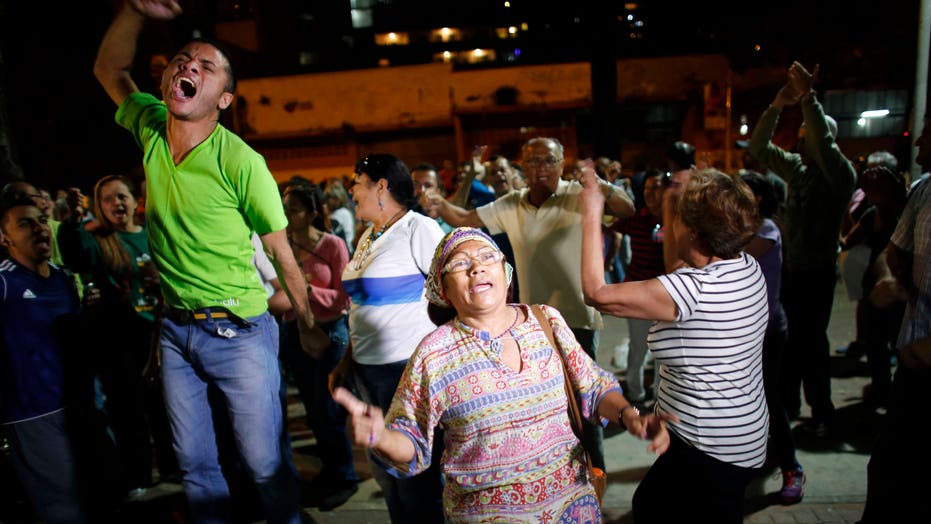Caracas – In a stunning victory, Venezuela’s opposition won control of the National Assembly on Sunday, tipping the balance of power for the first time in over a decade and loosening President Nicolas Maduro’s iron fist rule.
The National Electoral Council, or the CNE, announced that the opposition secured 99 seats and the government party 46 seats. The formal announcement was made by Tibisay Lucena, the president of the CNE, 30 minutes past midnight and almost six hours after polling stations closed.
It is the first time the opposition has wielded power since late president Hugo Chavez kicked off the nation’s socialist revolution in 1999.
Twenty-two of 167 seats were still too close to call after 96 percent of the votes were counted. The opposition said it expects to win some of those seats, which would put them over the 101 needed to control the supermajority in Congress.
“We should end with 113 or 115 congressmen. This will transform the Legislative Branch into an autonomic branch what Venezuela hasn’t had in the last 17 years,” said Henry Ramos Allup, an opposition leader from party Accion Democratica (Democratic Action), in an interview with CNN.
There are two types of supermajorities: With more than 101 congressmen, the opposition can remove the nation’s vice president or a ministry, while a majority of 112 gives it the authority to change the heads of the CNE, approve fundamental laws and introduce amendments to the nation’s Constitution.
“We estimate that we won with more than 2 million votes more [than the ruling party],” Enrique Marquez, a member of opposition party Un Nuevo Tiempo (A New Time), told Fox News Latino.
The streets of Caracas, the nation's capital, broke out in shouts of joy, fireworks and car honking after CNE's Lucena announced the perplexing partial results. In a plaza on the wealthy eastern section of Caracas, which was the epicenter of last year's bloody anti-government protests, a small group of opponents sipped champagne and burned the red shirts that are known as the revolutionary attire.
President Maduro conceded soon after the official announcement, blaming the outcome on the financial difficulties the country is going through.
“The economic war won because it was hardened in the last few weeks… Our conscience is clear because we did everything in our hands to protect the people of Venezuela,” Maduro said from Palacio de Miraflores, the presidential house.
While CNE’s first bulletin didn’t provide specific numbers, Maduro said that his party got 42 percent of the support.
The opposition prevailed in places it never had since Chavismo took power in 1999. The information on which districts were taken over is not out yet, but analysts expect big victories in central Venezuela — a region that in the past gave Chavismo large-margin wins.
The new National Assembly will be installed on Jan. 5, 2016.
Before Sunday’s vote, president Maduro announced that he would arrange a meeting with the elected congressmen to speak about the country’s economic situation. However, opposition leaders spoke in strident terms, a prelude to what's likely to be a period of intense political fighting in a deeply polarized country mired in an economic crisis.
Voter turnout was a stunning 74 percent, the highest for a parliamentary vote since compulsory voting ended in the 1990s, as Venezuelans punished Maduro's government for widespread shortages, a plunging currency and triple-digit inflation that has brought the economy to its knees.
"Venezuelan families are tired of living the consequences of the failure," Jesus Torrealba, head of the Democratic Unity opposition coalition, told supporters at campaign headquarters. "The country wants change and that change is beginning today."
Maduro had repeatedly vowed in recent weeks to take to the streets and defend his mentor Chavez's legacy if his party lost. But on Sunday night he softened his tone, urging his supporters to calmly regroup from the loss.
"I call on all of our people to recognize in peace these results and re-evaluate many political aspects of the revolution," he said.
But some government supporters are already bracing for a fight.
"Now everything will just get worse. The Chavistas will go to war with the opposition," said Diana Areaz, who waited with her friend to hear the results.
The opposition victory deals a serious setback to the socialist revolution started almost 17 years ago by the late Hugo Chavez, who until his death in 2013 had an almost-magical hold on Venezuela's long-excluded masses.
It was also a major blow to Latin America's left, which has been struggling in the face of a region-wide economic slowdown and voter fatigue in some countries with rampant corruption.
Last month, Argentines elected a conservative businessman over the chosen successor of Cristina Fernandez, who was a close ally of Chavez. In Brazil, President Dilma Rousseff is battling impeachment over a corruption scandal in her long-ruling Workers' Party.
The Associated Press contributed to this report.

